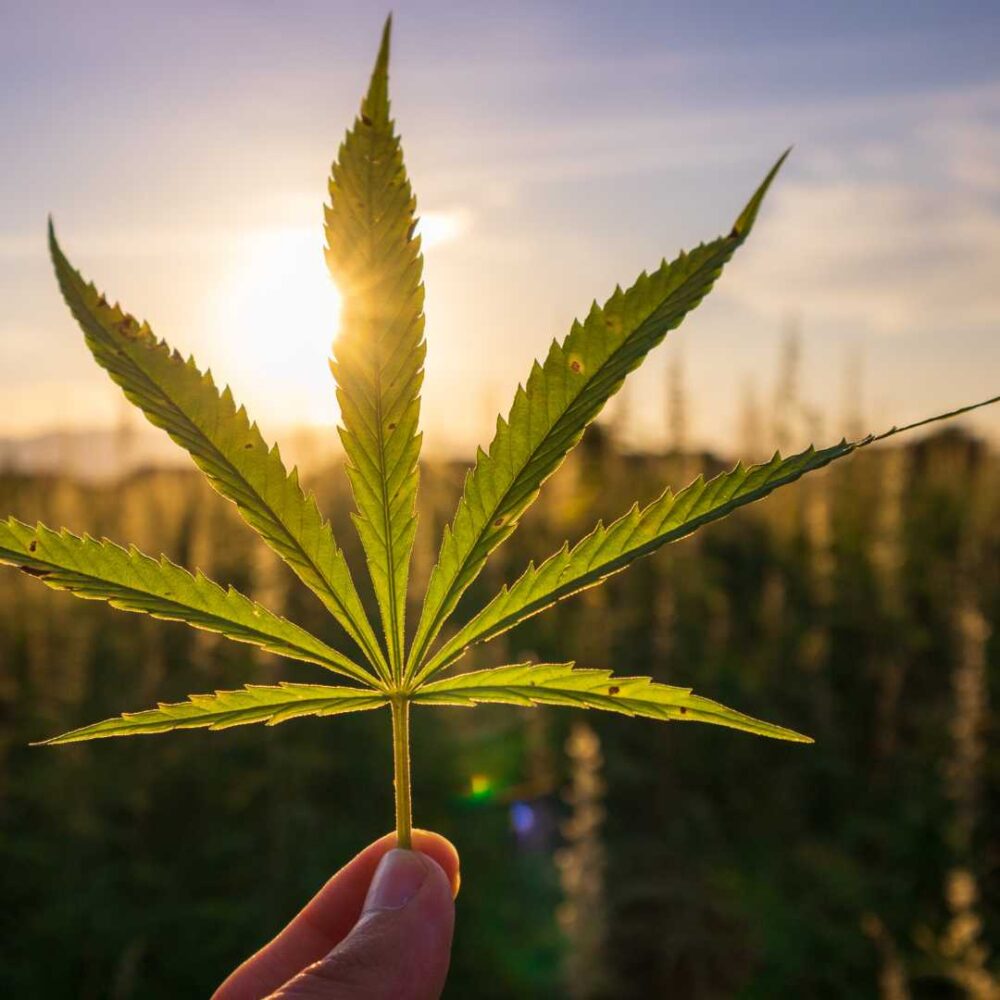
CBDA, formally called Cannabidiolic Acid, is the mother molecule to CBD.
To understand what CBDA is, we need to start with the raw Hemp flower. The hemp plant produces over 100 different acidic cannabinoids, CBDA (cannabidiolic acid) being the one typically found in the highest amount in the plant. Cannabinoids in their natural, unaltered state, are in the acidic form, which has a carboxyl group (-COOH).

CBDA is the natural, unaltered cannabinoid found in Hemp
To make a hemp oil product, there are two main steps, extraction and purification. CBDA is typically lost during the purification step and not the extraction process. Purification is typically needed to remove unwanted fats, lipids, and chlorophyll from the extracted crude oil. However, conventional purification uses significant heat, resulting in loss of CBDA and increase in CBD. This loss applies to other acidic cannabinoids as well, such as CBGA to CBG, CBCA to CBC, and CBDVA to CBDV.

CBDA is lost, and CBD is formed when Hemp oil is exposed to heated processing
Sections in this guide
- Difference and similarities between CBDA and CBD?
- Side effects and dosing of CBDA
- How much CBDA should I take?
- Can CBDA get you high?
- What does CBDA do?
- How to get high quality CBDA

What is the difference between CBDA and CBD?
While the structure of CBDA and CBD is similar, do they also have the same health benefits? Both CBD and CBDA have been found to have many beneficial properties, but CBDA has much better absorption than CBD, with some studies showing over 500% better absorption. This is critical to any nutraceutical or drug, since the ability of the compound to have an active effect inside the body is dependent on good absorption. Additionally, there is research showing that ingesting CBDA yields higher levels of blood CBD than taking the same amount of CBD itself, very counterintuitive.
What are the side effects and dosing of CBDA?
CBDA tends to have very little side effects, similar to CBD, and has been shown to be safe in in vivo animal models at high doses. The doses that have been tested vary depending on the study, but if we convert the mg/kg dose range to human weights, we see ranges from 60mg for a 150lb person to 6000mg for a 150lb person.
This brings into question what a hypothetical amount of CBDA someone should take. We think it depends on the individual and what benefit they are trying to reach. In our tinctures, we have found a 50mg serving can be beneficial, but this may differ between individuals and potential uses.
Some people have reported these side effects of CBDA:
- Drowsiness
- Headache
- GI disturbance with high amounts
- Fatigue
How much CBDA should I take?
The appropriate amount of CBDA to take can be dependent on the individual and what they are trying to accomplish. As you read above, many of the in vivo experiments performed use very high doses which is not recommended, and often the route of administration is injection (either i.p or s.c.). This does not translate well to oral unless they measure the CBDA amount in the blood. However, using an injection route provides much higher bioavailability (the concentration in the blood) than eating an edible or using a tincture.
Important note: vaping CBDA will decarboxylate the CBDA into CBD because of heat, thus losing some of the potential health benefits of taking CBDA.
Most of the CBDA products available have a serving between 15 and 30, while Natural Dos tinctures have a serving of 50mg. However, this will be dependent on the individual, and the consumer may need to test lower or higher amounts to see if that works for them
Can CBDA get you high?
Similar to CBD, CBDA is not a psychotropic, and will not get you high. While CBDA may affect your mood or anxiety, it primarily targets the cannabinoid 2 receptor (CB2), unlike the THC which primarily targets the CB1 receptor responsible for the psychotropic effects commonly associated with marijuana (see this review).
What does CBDA do?
CBDA has been tested using in vitro and in vivo studies to assess a wide range of potential benefits.
CBDA in anxiety and nausea
Many in vivo studies of CBDA have tested its ability to provide benefits in reducing anxiety and nausea. This study in mice found that CBDA administration normalized trauma-induced generalized anxiety-related behavior. Another study in rats found that giving low dose injections of CBDA (equivalent of 6mg in 150lb person) or high dose injections of CBD (equivalent of 300mg in 150lb person) reduced fear response.
There is considerable in vivo evidence that CBDA can decrease nausea and vomiting as well. This study found that injection of CBDA at an equivalent of 30mg in a 150lb person decreased nausea in rats. These studies have been repeated across different models of nausea with similar results, indicating that the effects of CBDA on nausea and vomiting could be very beneficial.
CBDA and inflammation
Excessive inflammation is often thought to be an underlying cause of many maladies, such as cardiovascular, cancer and diabetes. Cannabinoids, including CBDA, have been tested in many models of inflammation. A common pro-inflammatory enzyme, COX-2, was shown to be inhibited by CBDA in an in vitro model of inflammation. COX-2 inhibitors (Non-steroidal anti-inflammatory drugs (NSAIDs)) are a popular class of drugs to conditions with a strong inflammatory component. Additionally, there appears to be secondary mechanisms by which CBDA may decrease inflammation through the action on cannabinoid receptors.
CBDA and cancer
A lot of cancer studies start out as in vitro experiments to determine if a compound will have any effect on known cancer related cellular functions. CBDA has been tested in a number of cancer cell lines for efficacy, such as breast cancer cell lines, where it was shown to modulate a critical cancer gene transcription factor AP-1. Earlier studies on breast cancer cell migration, a critical step in the metastases of cancer, indicate that CBDA can prevent this step in vitro.
CBDA and sleep
Problems with good sleep hygiene is very common, with 1 in 3 people in the US reporting using some sleep medication of supplement according to a University of Michigan poll. CBD and CBN are the most studied cannabinoids for helping with sleep problems, and multiple studies have shown they may be beneficial (here, here, and here). Currently, there are no well detailed studies on CBDA and sleep, however, prior research has found that CBDA ingestion led to higher blood levels of CBD (possibly due to conversion during or post ingestion) compared to CBD ingestion alone, suggesting that any sleep effects it has is due to the actions of CBD.
How to get high quality CBDA
CBDA and acidic cannabinoid products are more difficult to produce because of the decarboxylation problem. Isolation of acidic cannabinoids for production is not possible with conventional purification technologies, which is why NaturalDos developed a novel process to purify the full spectrum of acidic cannabinoids. Our proprietary Natural Spectrum CBDA products have all the original acidic cannabinoids found in the hemp flower. Whoever you go with, always be sure to check their third-party testing results for CBDA. If you do not know how to do this, check out our detailed guide on how to read a certificate of analysis (CoA).
FAQ - What is CBDA?
CBDA is between 450% and 1000% better absorbed than CBD, so an equal dose of CBDA will have more of an impact than CBD. Recent studies show that CBDA is better absorbed when it is combined with other cannabinoids, so a full spectrum CBDA will be the most potent.
CBDA is the natural form of CBD, and is the most abundant cannabinoid found in the hemp flower. CBDA, like all acidic cannabinoids, has a carboxyl group that confers better absorption and water solubility.
CBDA also has unique properties compared to CBD, such as inhibition of the inflammatory enzyme COX2 (a common target of aspirin and ibuprofen).
CBDA also appears to act on the serotonin system through activation of the serotonin receptor 5HT1A.
Pre clinical trials show that CBDA has anti nausea, anti anxiety, and pain relief properties. In addition, it has enhanced absorption compared to CBD and many other cannabinoids.
Because of the difficulty in purifying the compound at scale, it has not received as much attention and research compared to CBD, but that is changing as new technology has been developed to purify acidic cannabinoids.
Many consumers report anxiety and stress relief, and is often taken for its calming effects. Additionally, help with some forms of chronic pain have been reported, but these still need clinical trials to confirm.

